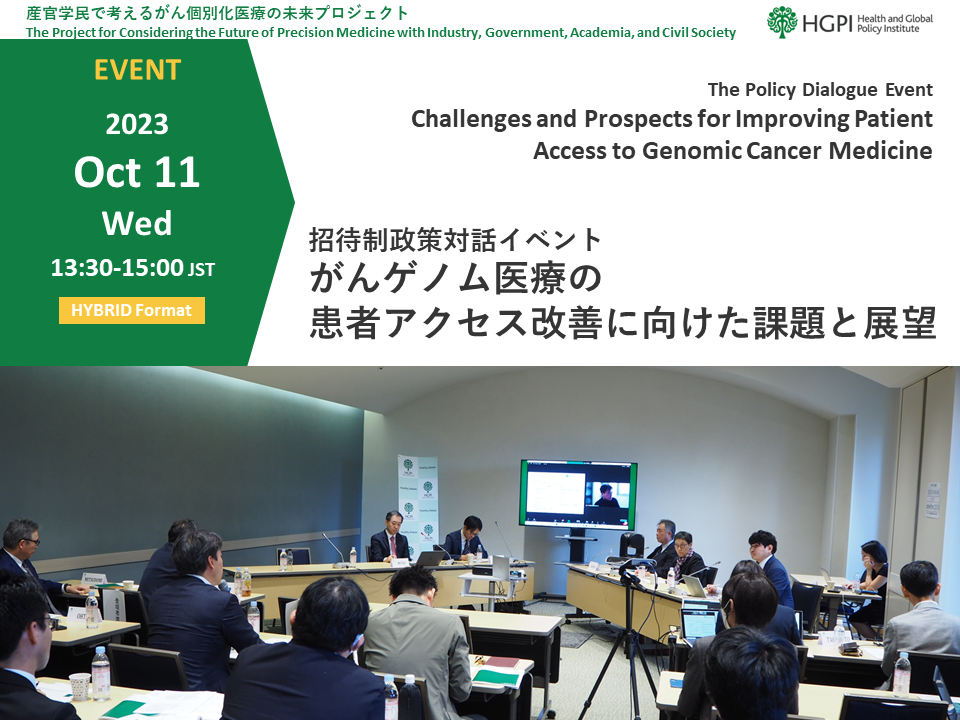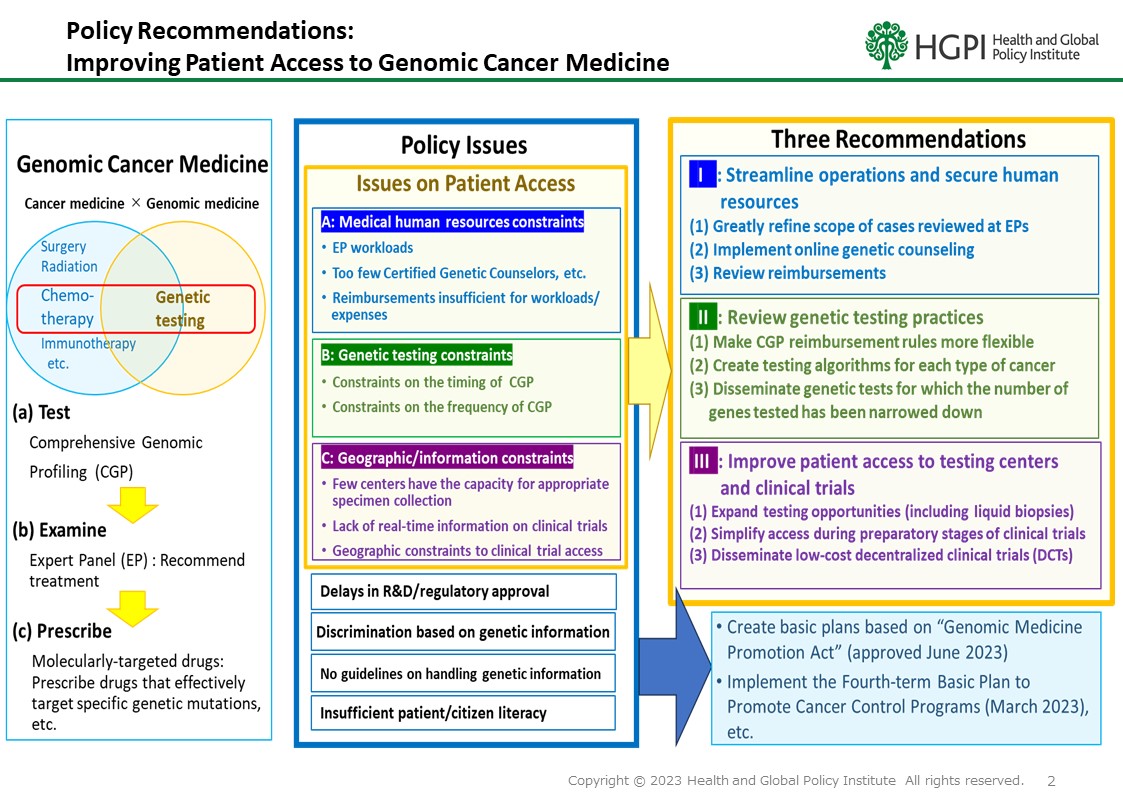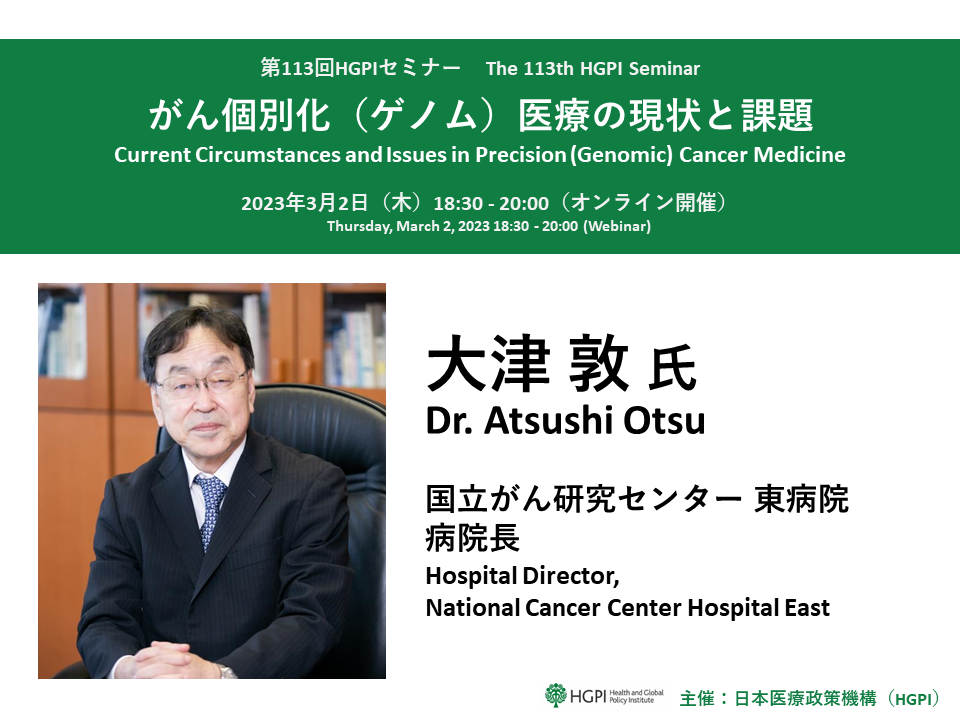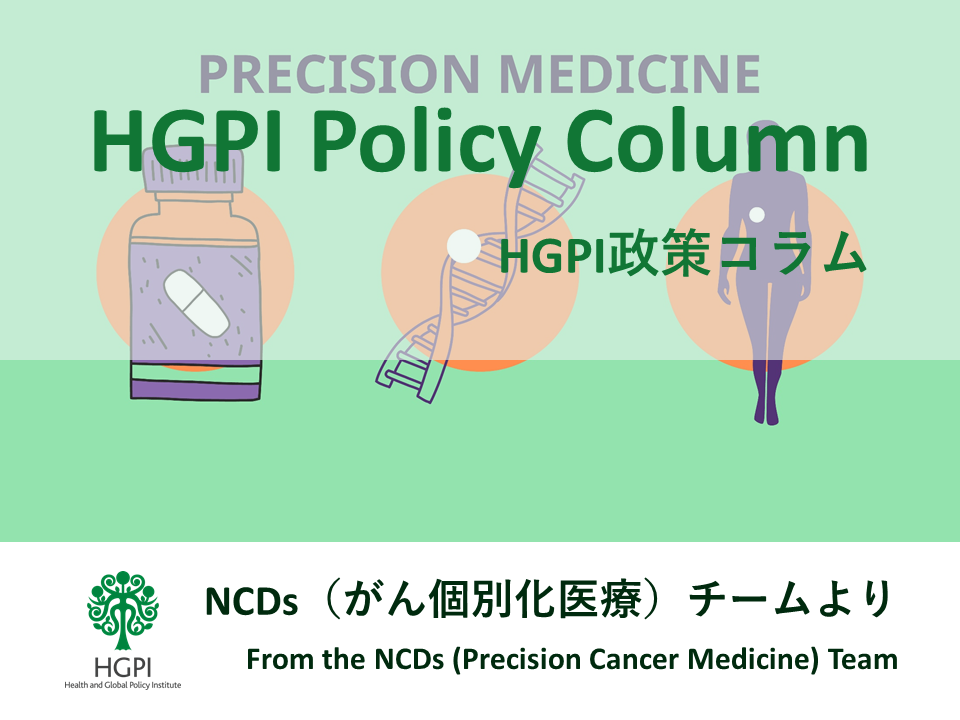[Event Report] Non-partisan Diet Member study session: “Challenges and Prospects for Improving Patient Access to Genomic Cancer Medicine” (December 12, 2023)
date : 12/18/2023
![[Event Report] Non-partisan Diet Member study session: “Challenges and Prospects for Improving Patient Access to Genomic Cancer Medicine” (December 12, 2023)](https://hgpi.org/en/wp-content/uploads/sites/2/dmb-ncd-pcm-20231212-top.png)
Health and Global Policy Institute (HGPI), under the auspices of the Japan Federation of Cancer Patient Groups, held a study session for non-partisan Diet members entitled “Challenges and Prospects for Improving Patient Access to Genomic Cancer Medicine”. Dr. Manabu Muto, Professor, Department of Therapeutic Oncology, Graduate School of Medicine, Kyoto University, gave a lecture on policy issues for improving patient access to Genomic Cancer Medicine. After his lecture, the Diet members attending the meeting asked many questions and engaged in a lively exchange of opinions.
Purpose
“Personalized cancer medicine (precision medicine)”, in which treatment is tailored to each individual based on genetic mutations and other characteristics of the cancer, is expected to play an important role in the future. Among these, “Genomic Cancer Medicine” is a medical treatment with development potential that should be widely provided to patients in the future, although clinical experience is accumulating with the inclusion of cancer gene panel tests in insurance coverage in June 2019. In June 2023, the “Genomic Medicine Law” (“Act on the Comprehensive and Systematic Promotion of Measures to Ensure the Public Can Access High-Quality, Suitable Genomic Medicine with Peace of Mind”) was enacted, and momentum is growing to promote Genomic Cancer Medicine. However, there are a wide range of policy issues that need to be addressed in order to expand Genomic Cancer Medicine, including not only issues that are common to medical care in Japan, but also many issues that are unique to Genomic Cancer Medicine.
The purpose of this study session for members of the Diet was to raise awareness of issues related to policies and necessary measures for “Improving Patient Access to Genomic Cancer Medicine”.
Issues to be addressed in Japan
- In Japan, cancer gene panel tests will be covered by insurance before the rest of the world in June 2019, which was expected to mark the dawn of precision medicine. However, the percentage of cancer gene panel tests that lead to treatment is less than 10%, leaving many patients without the benefit of testing.
- One of the reasons for this is the timing of cancer gene panel tests, and the fact that the test can only be done at the end of standard treatment is the main reason why it does not lead to treatment.
- Even though the expert panel discusses and recommends rare genetic mutations found by the cancer gene panel test every day, the extended clinical trial system does not work, and the fact that it is difficult to use the test outside the scope of application in Japan is also one of the reasons why it does not lead to treatment.
Political Requests
(1) Cancer gene panel tests are designed to efficiently and effectively lead to treatments that are expected to be effective, and we request that the current medical fee restrictions (after completion of standard treatment) be removed.
(2) We request that the current reimbursement system, in which companion diagnoses and profile tests are calculated separately, be improved to make effective use of the companion diagnoses included in cancer gene panel tests, and that the reimbursement be made a single reimbursement system for cancer gene panel tests.
(3) In order to further utilize the cancer gene panel test, it is necessary to establish a system (companion use and patient assistant program system) to provide drugs for rare mutations detected by the test on a humane basis as soon as possible.
(4) Cancer Gene Panel Testing to Improve Access to Treatment and Address Treatment Resistance
should be made available to patients for testing multiple times during their lifetime, rather than only once.
[Program] (Titles omitted)
Opening Remarks
 Katsuhito Nakajima (Member of the House of Representative / Executive Director of the Diet Members Caucus for the Development of a Social Environment for the Advancement of Appropriate Genetic Medicine)
Katsuhito Nakajima (Member of the House of Representative / Executive Director of the Diet Members Caucus for the Development of a Social Environment for the Advancement of Appropriate Genetic Medicine)
Explanation of purpose and introduction of the policy proposal “ Improving Patient Access to Genomic Cancer Medicine
 Haruka Sakamoto (Senior Manager, Health and Global Policy Institute)
Haruka Sakamoto (Senior Manager, Health and Global Policy Institute)
Lecture “Challenges and Prospects for Improving Patient Access to Genomic Cancer Medicine”
Manabu Muto (Professor, Department of Therapeutic Oncology, Graduate School of Medicine, Kyoto University)
Closing Remarks
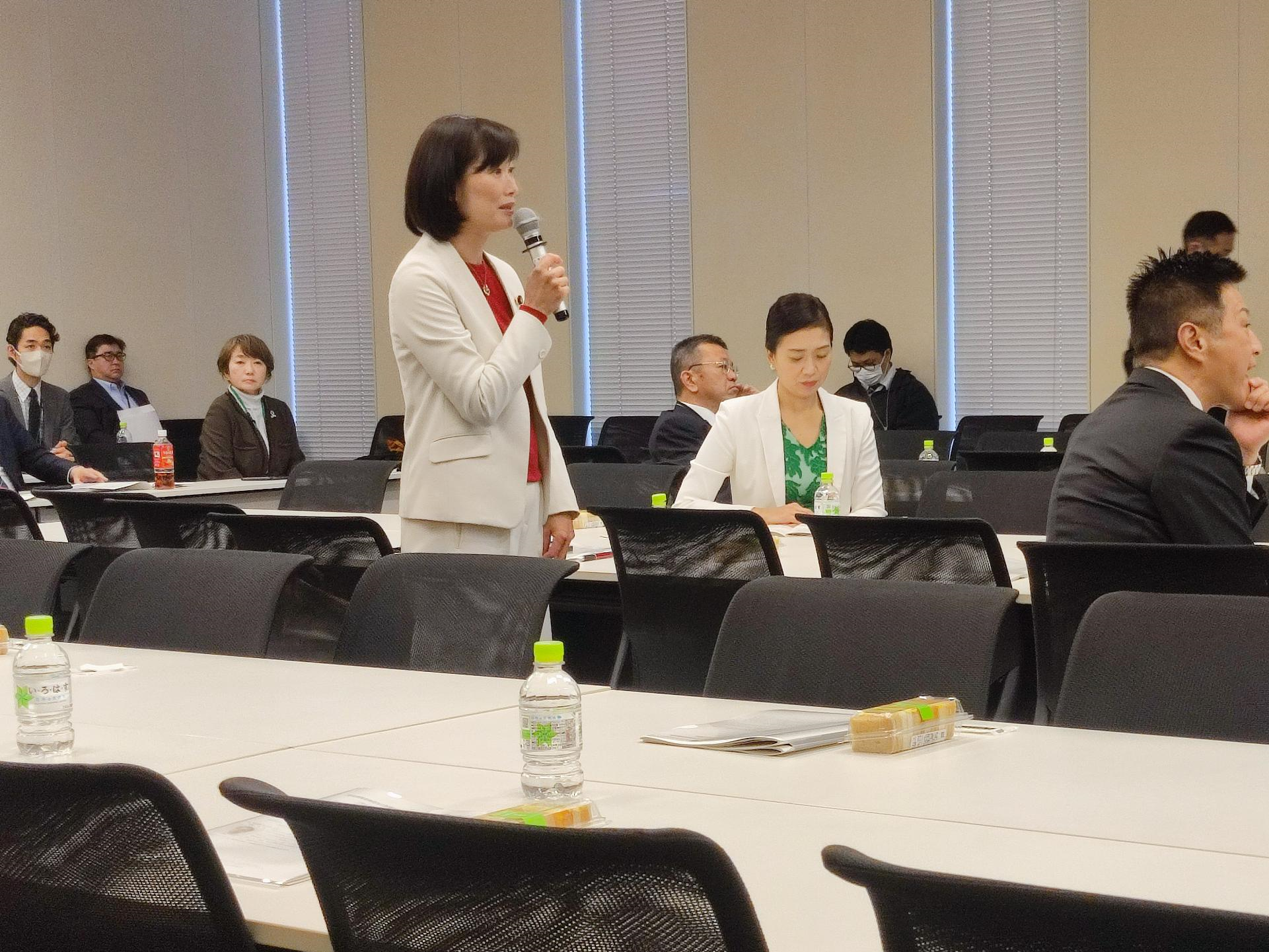 Tamayo Marukawa (Member of the House of Councillors / Acting President of the Diet Members Caucus for the Development of a Social Environment for the Advancement of Appropriate Genetic Medicine)
Tamayo Marukawa (Member of the House of Councillors / Acting President of the Diet Members Caucus for the Development of a Social Environment for the Advancement of Appropriate Genetic Medicine)
Question and answer session
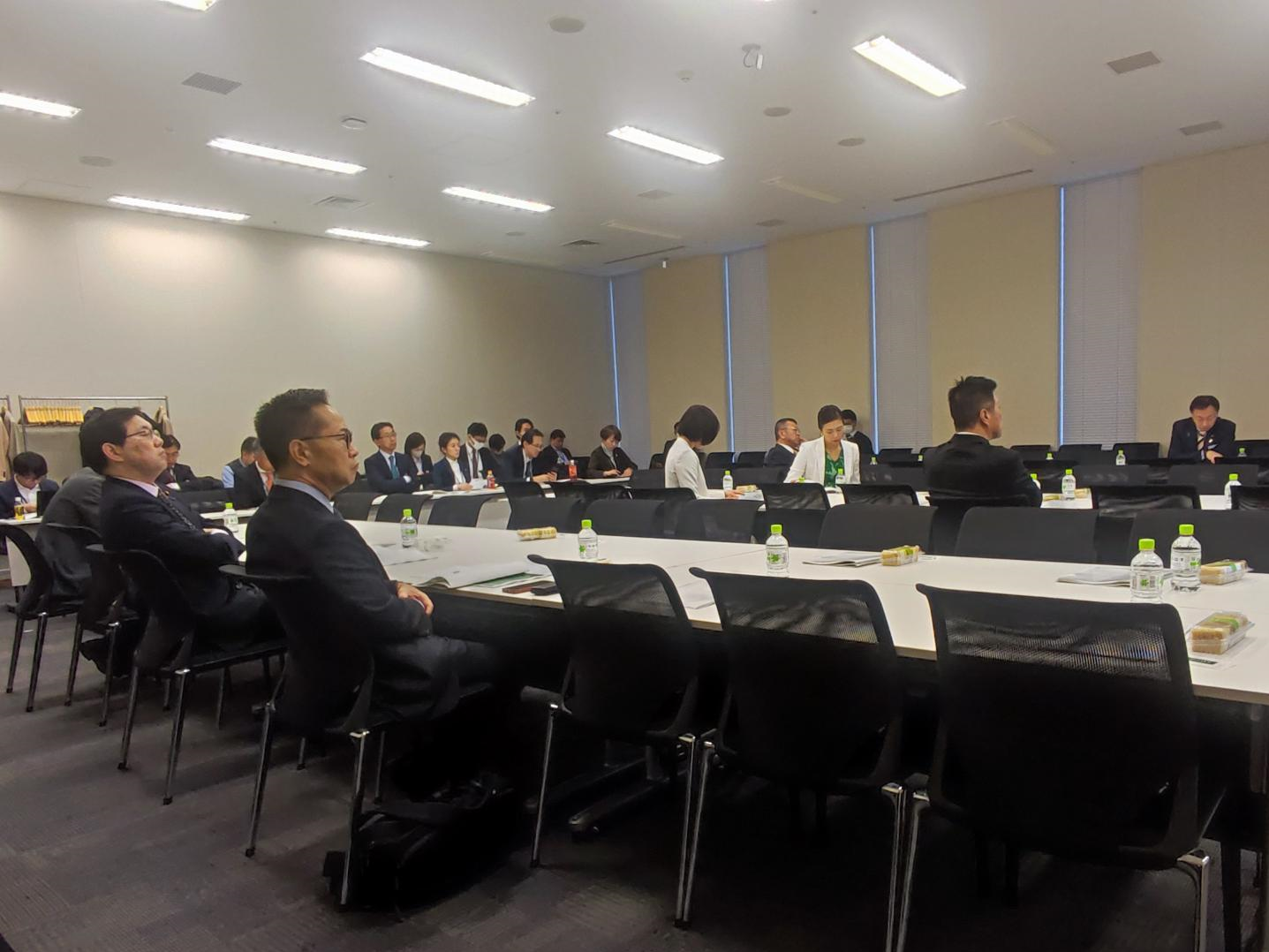
Top Research & Recommendations Posts
- [Policy Recommendations] The Path to a Sustainable Healthcare System: Three Key Objectives for Public Deliberation (January 22, 2026)
- [Research Report] The 2025 Public Opinion Survey on Healthcare in Japan (March 17, 2025)
- [Research Report] Perceptions, Knowledge, Actions and Perspectives of Healthcare Organizations in Japan in Relation to Climate Change and Health: A Cross-Sectional Study (November 13, 2025)
- [Policy Recommendations] Reshaping Japan’s Immunization Policy for Life Course Coverage and Vaccine Equity: Challenges and Prospects for an Era of Prevention and Health Promotion (April 25, 2025)
- [Research Report] The 2023 Public Opinion Survey on Satisfaction in Healthcare in Japan and Healthcare Applications of Generative AI (January 11, 2024)
- [Research Report] AMR Policy Update #4: Cancer Care and AMR (Part 1)
- [Public Comment Submission] “Assessment Report on Climate Change Impacts in Japan (Draft Overview)” (December 24, 2025)
- [Policy Recommendations] Developing a National Health and Climate Strategy for Japan (June 26, 2024)
- [Research Report] The Public Opinion Survey on Child-Rearing in Modern Japan (Final Report) (March 4, 2022)
- [Research Report] Survey of Japanese Physicians Regarding Climate Change and Health (December 3, 2023)
Featured Posts
-
2026-01-09
[Registration Open] (Hybrid Format) Dementia Project FY2025 Initiative Concluding Symposium “The Future of Dementia Policy Surrounding Families and Others Who Care for People with Dementia” (March 9, 2026)
![[Registration Open] (Hybrid Format) Dementia Project FY2025 Initiative Concluding Symposium “The Future of Dementia Policy Surrounding Families and Others Who Care for People with Dementia” (March 9, 2026)](https://hgpi.org/en/wp-content/uploads/sites/2/dementia-20260309-top.png)
-
2026-02-05
[Registration Open] (Webinar) The 141st HGPI Seminar “Current Status and Future Prospects of Korea’s Obesity Policy: Voices of People with Lived Experience in Policy Promotion” (March 3, 2026)
![[Registration Open] (Webinar) The 141st HGPI Seminar “Current Status and Future Prospects of Korea’s Obesity Policy: Voices of People with Lived Experience in Policy Promotion” (March 3, 2026)](https://hgpi.org/en/wp-content/uploads/sites/2/hs141-top-1.png)
-
2026-02-06
[Research Report] AMR Policy Update #5: Cancer Care and AMR (Part 2)
![[Research Report] AMR Policy Update #5: Cancer Care and AMR (Part 2)](https://hgpi.org/en/wp-content/uploads/sites/2/HGPI_20260204_AMR-Policy-Update-5.png)




